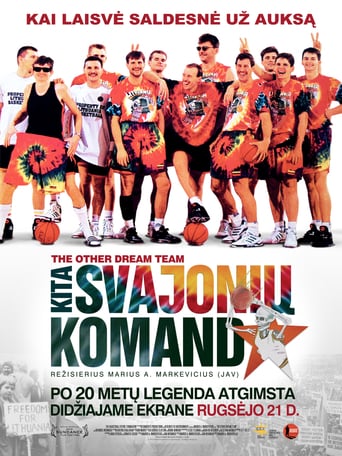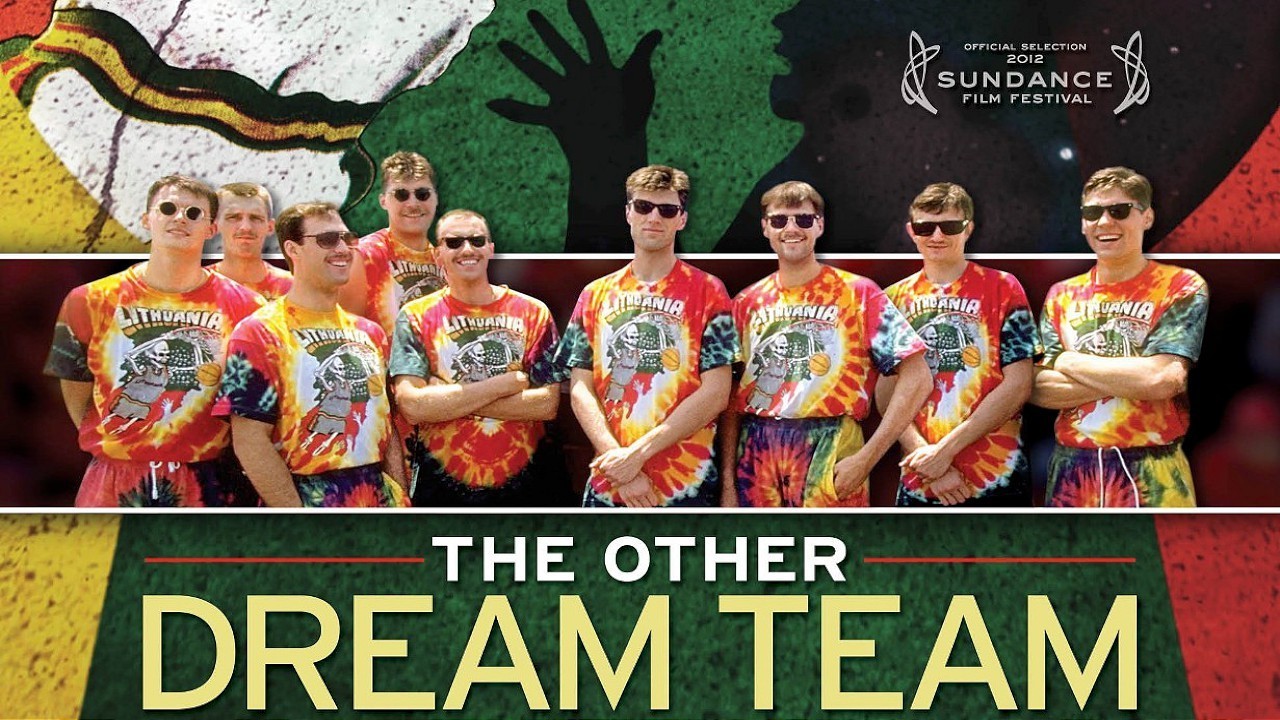Larry Silverstein
This is an extremely heart-felt and powerful documentary not only on basketball and the country of Lithuania, but also about freedom, national pride, and the human spirit. I had no idea, before viewing this movie, that basketball is the #1 sport in Lithuania, and has been so for many decades. However, when the nation fell under the yoke of the Soviet Union's Iron Curtain, in 1940, Lithuania basketball players were forced to compete as Russians on the world stage.At the 1988 Seoul Olympics, the United States had been 84-1 in Olympic competition, but the Soviet team defeated them. Four of the starting five players on that team were from Lithuania, including Arvydas Sabonis and Sarunus Marciulionis, who are featured mainly in the film, and who went on eventually to play in the NBA.One highlight of the documentary was film footage of the Lithuanian Declaration of Independence, in January 1991, after the Berlin Wall had come down and after Mikhail Gorbachev's announcement of "perestroika". However, Gorbachev would not accept their independence and sent in tanks and troops leading to bloodshed. When Lithuanians came out en masse to protest and resist, and pressure was applied from the West, Russia backed down and withdrew leading to Lithuania becoming independent after all.This lead to their appearance, in 1992 at the Barcelona Olympics, as a basketball team that could compete under their own country's banner. Since the nation was essentially bankrupt a most unusual funding relationship developed between the musical band "The Grateful Dead" and the Lithuanian basketball team, which included wild and colorful tie-dye T-shirts.This helped the team to compete at the Olympics, but it was also the year of U.S. Dream Team, the greatest assemblage of basketball players ever, including such notables as Michael Jordan, Larry Bird, Magic Johnson, Charles Barkley etc. etc. The Lithuanians and the Americans were in the same bracket, with both teams sweeping through their preliminary games, to meet in the semi-finals where the U.S. just overwhelmed the Lithuanians (and went on to win the Gold Medal over Croatia). The story doesn't end there though, as the Lithuanians would now play their bitter rivals the Russians (as the Unified Team) for the bronze medal. The Lithuanians defeated the Russians in a game with enormous political as well as sports implications. This set off a tremendous wave of national pride throughout Lithuania, that they could compete and win under their own flag finally.All in all, this heart-felt documentary had me engrossed from start to finish and I felt it was extremely well presented, by producer and director Marius Markevicius. It's one of the best documentaries I've seen in recent years.
MartinHafer
"The Other Dream Team" is about Lithuanian basketball from the mid-1980s to today--with a particular emphasis on how this all relates to Lithuanian independence from the old Soviet Union. It seems that this tiny nation was the backbone of the 1988 gold medal basketball team. But what would happen when the USSR fell apart? And, how would this new team help to unify the nation? The film consists of tons of interviews, film clips and photos. Together they tell an inspiring story. In many ways, this is highly reminiscent of another film---one about Lithuania's neighbor, Latvia. In "The Singing Revolution", it talks about this same time period--when these people in a tiny nation stood firm against their Soviet overlords. However, instead of basketball unifying the country, it was their heritage of music. Both are simply terrific films--the sort of well-crafted documentaries that leave you choked up. Great films about freedom and the human spirit.
makelvin
This is an interesting documentary. In my opinion, the title of this documentary should not be called "The Other Dream Team" but rather it should be called "The Real Dream Team". This documentary talks about the story behind the Lithuanian's '92 Olympic Basketball team and it is a real moving story of triumph.In '92, the US Dream Team is really just more or less a commercial dream whereas the Lithuanian dream team carry with them the dream of freedom, the dream of recognition from around the world, the dream of independence and most of all, the dream of a nation.Basketball fan everywhere should watch this documentary; but I am sure even non-basketball fan should find this inspirational.
kelvinho84
Dave Zirin, one of America's most prolific political sportswriter, wrote that "the very passion we invest in sports can transform it from a kind of mindless escape into a site of resistance." With all the pomp and circumstance we afford sports today - the 24-hour cycle of media coverage, greedy ownership, athletic merchandising and advertisements – sports have become merely another cog in today's economic globalization. For the younger generation, it may be hard to fathom that before the Michael Jordans, Lebron James, and Tiger Woods, it was the Muhammad Alis, John Carlos and Tommie Smiths that globalized their respective sports, not through commercial means, but political ones. As an avid sports fan, I find that sports is at its most entertaining when it is infused with some sort of political implication. And anyone who dares to suggest that sports and politics should never coexist is mind-numbingly misinformed. While we still see the cultural and political resonance in international sports today, American sports has been politically starving for quite some time. Consider soccer's international stage, specifically the "El Clasico" matches between Spanish giants Real Madrid and Barcelona. The sport becomes a political means of contestation between divided factions within the nation. Imagine how great the NFL would be if their games had a hint of cultural and political significance. Why don't we encourage and cheer for the defeat of the Arizona Cardinals, a state that encourages racist policies and treatment of immigrants? We do not because this is a testament to how successfully corporate America has shielded us from the everyday concerns of this country. Sport is cheered because it comforts us from real worries. Don't worry about Hurricane Sandy. The New York Knicks and the Miami Heat are playing! The reason I bring this up is because in Marius Markevicius's new film "The Other Dream Team," not only does it reveal how sports became a form of resistance but it is contrasted with the moment when sports was devaluing in American society. "The Other Dream" is a compelling and insightful documentary about the Lithuanian basketball team in the 1992 Olympics in Barcelona, Spain. Before Lithuania was a sovereign nation, it was a tiny nation sandwiched between two oppressive countries, Germany and the Soviet Union. The film chronicles the extent to which the Soviet Union ruled this tiny population with an iron fist. At the center of the film are Sarunas Marculionis and Arvydas Sabonis, the two stars of the Lithuanian basketball team. The former was drafted by the Golden State Warriors and the latter played for the Portland Trailblazers. The film juxtaposes the extreme political conditions in which they lived under with the fact that they played for the USSR. In the '88 Olympics, four Lithuanian players made up the Soviet team and helped lead their oppressive rulers lift the gold. Despite their exceptional talent, the government hindered their progress as they made it difficult for them to play in the NBA. After the end of the Cold War, Lithuania gained its independence. Then with the 1992 Olympics coming up, Lithuania saw a window of opportunity to present themselves in the world's stage. With the funding from the Grateful Dead and sporting totally awesome psychedelic tie-dye shirts, the Lithuanian basketball team played for more than just victory. They played for resistance. They played for identity and nationalism. Although they eventually lost to the Dream Team in the semi-finals, it was the third-place match against the Soviet Union that was pivotal for the nation. Markevicius does a very good job at always focusing on the political aspects of the story. He strays away from the typical norms in sports films. What I love most about the film though is perhaps unintended by the director. While the film is ultimately about the Lithuanian basketball team and how the sport served as a weapon of resistance, it conversely reveals the deterioration of politics in American sports. Although the film hardly focuses on it, the contrast is there. The formulation of America's Dream Team may have some political significance. With the Cold War nearing its end, their need to reclaim the gold from the Soviet Union is very much in the back of their minds. Yet, the dominance of the USA team always remained at a superficial basketball level. They were not playing for nationalization. They played for fame at a global level. I believe this set the trend for basketball, once America's most politically laden sport, to become part of the economic globalization. "The Other Dream Team" is great in that it proves sport is inherently political, even when it is not.


 AD
AD

